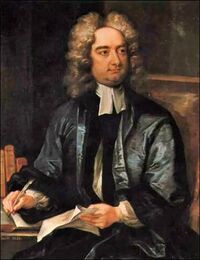
Portrait of Jonathan Swift.
Jonathan Swift (November 30, 1667 - October 19, 1745) was an Irish author who is best known for his satirical novel Gulliver's Travels. He was also a poet, essayist and political pamphleteer, first writing pamphlets in support of the British Whig party and later in support of the opposing Tory party. All of his works were originally published anonymously or under pseudonyms.
Swift was born in Dublin to an Irish-born father, also named Jonathan Swift, and an English mother, Elizabeth Dryden. Swift was born seven months after his father had died. It is believed that Swift's mother returned to England while he was still and child and that he was cared for by an uncle.
In 1688 Swift chose to leave Ireland, due to political upheaval, and came to England. As a result of his mother's influence he found a position as secretary to the diplomat Sir William Temple.
At the home of Sir William Temple, Swift met Esther Johnson, a fatherless eight-year old, the daughter of a household servant. Swift became the girl's tutor, nicknamed her "Stella" and maintained a lifelong relationship with her. The nature of Swift's relationship with Esther Johnson is uncertain. It has been suggested that he secretly married her in 1712.
Criticism of an essay by Sir William Temple, regarding whether or not 18th century people were more knowledgeable than the ancient Greeks and Romans, inspired Swift to write his first major work The Battle of the Books, written in 1690 but not published until 1704. The Battle of the Books describes books by ancient and 18th century authors fighting each other in a library.
Swift became an ordained minister in the Protestant Church of Ireland in 1694, he twice served as parish priest to small Irish communities but also spent long periods of time in Dublin, Oxford and London.
Swift became a well regarded writer thanks to his satirical works A Tale of a Tub (1704), Gulliver's Travels (1726) and A Modest Proposal (1729). He gained a reputation as an Irish patriot as a result of essays that he wrote during his time in Ireland.
